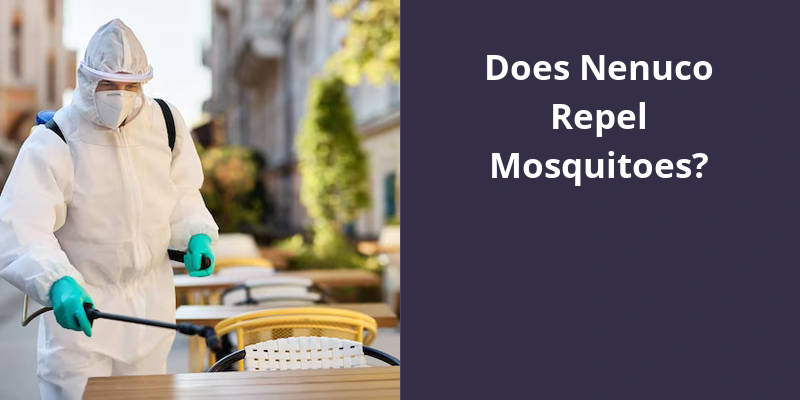Nenuco, a popular Spanish cologne, is often touted for its potential mosquito-repelling properties. However, there isn’t any scientific evidence to confirm this belief. While some users claim that Nenuco successfully keeps mosquitoes at bay, it could be due to other factors rather than the cologne itself. It’s also worth noting that what works for some might not work for others given the variations in personal body chemistry. Consequently, while Nenuco might provide some level of deterrence, it should not be relied upon as a primary method of mosquito protection. It’s advisable to turn to proven and established insect repellents for effective and reliable protection against mosquitoes.

Is Nenuco Mosquito Repellent?
Nenuco is a widely recognized brand that’s been popular among Spanish consumers for many years. While the manufacturers may not explicitly advertise Nenuco as a mosquito repellent, many people in Spain have found it to be effective in deterring mosquitoes. One of the reasons why Nenuco is believed to repel mosquitoes is it’s scent, which is known for being fresh and clean.
The convenience of Nenucos pump spray also adds to it’s appeal as a mosquito repellent. The easy-to-use spray allows for quick and efficient application, making it a practical choice for those living in areas prone to mosquito infestations.
Personal testimonials and word-of-mouth recommendations can be valuable indicators of a products effectiveness, even if they aren’t backed by scientific studies or official endorsements.
Alternative Natural and DIY Mosquito Repellent Methods, Including the Use of Essential Oils, Plants, and Other Household Products
- Use citronella oil: Apply citronella oil to your skin or burn citronella candles to repel mosquitoes.
- Plant mosquito-repelling herbs: Grow plants like lemongrass, lavender, and basil to deter mosquitoes.
- Use garlic: Eating garlic or rubbing garlic oil on your skin can help repel mosquitoes.
- Try neem oil: Apply neem oil to your skin or mix it with water to create a natural mosquito repellent spray.
- Burn coffee grounds: Burning used coffee grounds can create smoke that repels mosquitoes.
- Use lemon eucalyptus oil: Apply lemon eucalyptus oil to your skin for a natural mosquito repellent.
- Install window screens: Fit your windows and doors with screens to prevent mosquitoes from entering your home.
- Remove standing water: Mosquitoes breed in standing water, so eliminate any sources of stagnant water around your property.
- Use vinegar: Spraying vinegar around your outdoor areas can help repel mosquitoes.
- Wear light-colored clothing: Mosquitoes are attracted to dark colors, so opt for light-colored clothing to reduce your attractiveness to them.
Additionally, certain natural remedies like apple cider vinegar, garlic, and neem oil have been known to repel mosquitoes effectively. These natural alternatives not only help in keeping mosquitoes away but also offer a safe and environmentally-friendly approach to pest control.
What Keeps Mosquitoes Away Naturally?
When it comes to keeping mosquitoes away naturally, there are several options to consider. One popular choice is the use of essential oils. Citronella, lemongrass, and lavender are all known for their mosquito-repelling properties. These oils can be easily incorporated into DIY repellent sprays or diffusers, providing a natural and effective solution to keep those pesky insects at bay.
In addition to essential oils, certain plants can also help deter mosquitoes from your surroundings. Marigolds, for example, are known to contain compounds that mosquitoes find repulsive. By planting marigolds in your garden or placing potted marigold plants near entrances, you can create a natural barrier against mosquitoes.
While these natural methods can be effective in repelling mosquitoes, it’s important to note that their efficacy may vary depending on the individual and environmental factors. Additionally, it’s always a good idea to follow proper mosquito control practices, such as removing standing water and wearing protective clothing, to minimize mosquito populations and reduce the risk of bites. So, while Nenuco may not specifically repel mosquitoes, there are plenty of natural options available to keep these unwanted pests away.
Source: 10 Home Remedies For Mosquito Control – Natural Ways That …
When it comes to repelling mosquitoes, two substances that have proven effective are DEET and oil of lemon eucalyptus sprays. DEET, a common ingredient in many mosquito repellants, has shown promising results. However, for those who prefer a more natural approach, oil of lemon eucalyptus sprays, derived from the gum eucalyptus tree, can also reduce mosquito attraction by up to 60 percent.
Does Anything Actually Repel Mosquitoes?
Mosquitoes are a ubiquitous nuisance, and finding an effective repellent can be a constant battle. With an abundance of options available on the market, it begs the question: does anything actually repel mosquitoes? Well, there are a few products that have proven to be effective in deterring these pesky bugs.
One of the most well-known and widely used repellents is DEET. This chemical compound has been around for decades and is highly effective in warding off mosquitoes. Numerous studies have shown that products containing DEET can reduce mosquito attraction by a significant margin. While DEET is a synthetic compound, it’s been extensively researched and approved for safe use by regulatory authorities.
For those seeking a more natural alternative, oil of lemon eucalyptus sprays have emerged as another option. Derived from the gum eucalyptus tree, these sprays have shown promising results in repelling mosquitoes. Research has indicated that oil of lemon eucalyptus can reduce mosquito attraction by up to 60 percent. This makes it an appealing choice for individuals preferring a more environmentally friendly approach.
However, it’s essential to note that not all mosquito repellents are created equal. It’s crucial to be discerning when selecting a repellent and look for well-researched ingredients with demonstrated results.
Additionally, it’s important to consider that individual reactions can vary. Mosquitoes are attracted to certain scents and chemicals present in our bodies, making some people more susceptible to bites. Factors such as body chemistry, metabolism, and even blood type can influence mosquito behavior. Therefore, what works for one person may not work as effectively for another.
Other Synthetic Compounds Commonly Used in Mosquito Repellents and Their Effectiveness
There are several other synthetic compounds commonly used in mosquito repellents apart from Nenuco. One of them is DEET, which is considered to be highly effective in repelling mosquitoes. DEET works by interfering with the mosquito’s sense of smell, making it difficult for them to locate humans. Another commonly used compound is picaridin, which is also effective in repelling mosquitoes. Picaridin works by blocking the mosquito’s ability to detect human scent. Additionally, there are synthetic pyrethroids such as permethrin, which are commonly used in insecticide-treated clothing. These compounds repel and kill mosquitoes upon contact. Overall, when used according to the instructions, repellents containing these synthetic compounds can effectively repel mosquitoes and reduce the risk of mosquito-borne diseases.
The most effective type of mosquito repellent, according to experts, is one that contains DEET, picaridin, or IR3535. These ingredients have been found to have broad efficacy against various arthropods and are effective on both skin and clothing. It’s recommended to look for repellents with a high concentration of active ingredients, ranging from 10% to 30%, especially in areas with a high mosquito population.
What Is the Most Effective Type of Mosquito Repellent?
When it comes to finding the most effective type of mosquito repellent, experts unanimously agree that products containing DEET, picaridin, and IR3535 are your best bets. DEET, short for N,N-Diethyl-meta-toluamide, has long been recognized as an effective mosquito repellent and is recommended by organizations such as the CDC. It provides a strong and long-lasting barrier against mosquitoes, ticks, and other biting insects.
Picaridin, also known as icaridin, is another popular choice among experts. This colorless and odorless insect repellent is effective against a wide range of arthropods, including mosquitoes, ticks, flies, fleas, and gnats. It can be directly applied to the skin or clothing, making it a versatile option for outdoor activities.
IR3535 is another active ingredient that’s highly recommended by experts. This repellent has been extensively tested and proven to repel mosquitoes, ticks, and biting flies.
In addition to choosing the right active ingredient, dilution is also an important factor to consider. For areas with high mosquito activity, experts recommend opting for repellents with 10% to 30% concentration of active ingredients. This higher concentration provides longer-lasting protection and is particularly important in regions where mosquito-borne diseases are prevalent.
It’s worth noting that while these three types of repellents are considered highly effective, there’s no one-size-fits-all solution. It may be necessary to try different products to find the one that works best for you.
Natural Mosquito Repellents: Discuss the Effectiveness and Potential Drawbacks of Natural Mosquito Repellents, Such as Citronella, Lemon Eucalyptus, and Lavender.
Many people turn to natural mosquito repellents as a safer alternative to chemical-based products. Common natural repellents include citronella, lemon eucalyptus, and lavender. While these natural options may have some effectiveness in repelling mosquitoes, it’s important to understand their limitations.
Citronella oil, derived from the citronella plant, is a common ingredient in many mosquito repellent products. However, it’s effectiveness can vary, and it may need frequent reapplication to maintain it’s repellent properties.
Lemon eucalyptus oil is another natural alternative that’s been shown to have some mosquito-repelling properties. It contains a compound called PMD (p-Menthane-3,8-diol) that can provide protection, but it might not be as long-lasting as synthetic repellents.
Lavender, known for it’s calming fragrance, is also sometimes used as a mosquito repellent. While lavender essential oil can have a pleasing aroma, it’s effectiveness as a repellent is relatively weak compared to other options.
It’s important to note that natural mosquito repellents may not provide complete protection against all mosquito species. They may also need to be reapplied more frequently than chemically-based repellents. In areas with a high risk of mosquito-borne diseases, such as Zika or dengue, it’s recommended to use EPA-approved repellents for maximum protection.
When using any mosquito repellent, natural or synthetic, it’s always advisable to follow the instructions on the product label and take additional precautions, such as wearing long sleeves and pants, to further reduce mosquito bites.
There are various ways to keep mosquitoes at bay, and one effective solution lies in the power of scent. Harnessing the natural properties of citronella oil, you can ward off these pesky insects and create a mosquito-free environment. Whether it’s through the use of citronella candles or incorporating citronella essential oil into your home, this natural repellent won’t only deter mosquitoes but also provide a refreshing fragrance.
What Smell Kills Mosquitoes?
Citronella oil has long been recognized as a potent mosquito repellent due to it’s strong scent that drives mosquitoes away. It’s derived from the leaves of the citronella plant and is known for it’s natural insect-repelling properties.
These candles are infused with the essential oil and release a fragrance that repels mosquitoes. Placing these candles around your house or outdoor areas can help create an environment that’s less attractive to mosquitoes, reducing the chances of getting bitten.
Another option is to use citronella essential oil in a vaporizer or oil diffuser. By adding a few drops of citronella oil to these devices, the oil is dispersed into the air, filling the room with it’s distinct scent. This can help repel mosquitoes, making it more difficult for them to enter your living spaces.
It’s efficacy may vary depending on the circumstances, such as the concentration of citronella oil used, the size of the area being protected, and the mosquito species present. In areas with a high mosquito population, additional measures may be necessary, such as using mosquito nets, wearing protective clothing, or using insect repellents containing DEET.
While it’s an effective deterrent, it isn’t a one-size-fits-all solution, and other mosquito control measures may be necessary in high-infestation areas.
While cologne may be a popular choice for many, it may not be the best option when it comes to repelling mosquitoes. These pesky insects are naturally attracted to certain fragrances found in perfumes, colognes, lotions, soaps, and shampoos. To avoid being a magnet for mosquitoes, it’s advisable to avoid products that leave a lingering scent and find alternative ways to keep these bugs at bay.
Can Cologne Repel Mosquitoes?
Mosquitoes are notorious for their ability to track down humans and leave itchy, irritating bites. While bug sprays and other insect-repellent products are commonly used to ward off these pests, some people wonder if cologne could have a similar effect. The answer isn’t as straightforward as one might hope.
Mosquitoes are attracted to certain fragrances found in perfumes, colognes, lotions, soaps, and shampoos. They’re especially drawn to floral scents, fruity fragrances, and sweet-smelling products. When you wear such scents, you inadvertently make yourself more enticing to mosquitoes, increasing the likelihood of getting bitten.
To prevent mosquitoes from tracking you down, it’s advisable to steer clear of anything that leaves a lingering scent. Opt for fragrance-free or unscented products, particularly when spending time outdoors in mosquito-prone areas. These unscented products provide a safer option as they don’t attract mosquitoes, reducing the chances of being bitten.
Certain essential oils, such as citronella, lavender, eucalyptus, and lemon, have natural mosquito-repelling properties. Incorporating these scents into your personal care routine, such as using a cologne that contains these oils, may help in repelling mosquitoes to some extent.
However, it’s important to note that the efficacy of these scents varies from person to person, and they may not provide complete protection against mosquitoes. To ensure maximum effectiveness, it’s recommended to also use other mosquito-repellent measures, such as wearing long sleeves and pants, using mosquito nets, and applying insect repellent products specifically designed to repel mosquitoes.
It’s best to avoid strongly scented products and opt for fragrance-free options.
The Dangers of Mosquito Bites and the Diseases They Can Transmit
It’s important to be aware of the dangers associated with mosquito bites and the diseases they can transmit. Mosquitoes are known carriers of various viruses and parasites that can cause serious illnesses like malaria, dengue fever, Zika virus, yellow fever, and West Nile virus.
These diseases can lead to symptoms ranging from mild discomfort to severe illness and even death in some cases. Mosquitoes typically thrive in warm and humid environments, making them common in many parts of the world.
To protect yourself and your loved ones from mosquito-borne diseases, it’s recommended to take preventative measures. This includes using mosquito repellents, wearing long-sleeved clothing, and sleeping under mosquito nets in areas where mosquitoes are prevalent.
Nenuco is a popular brand of baby products, including mosquito repellents. While it’s designed to repel mosquitoes and reduce the risk of bites, it’s always important to follow the instructions provided by the manufacturer and consult with healthcare professionals for specific advice.
Remember, consistent protection against mosquito bites is crucial, especially when traveling to areas where mosquito-borne diseases are prevalent. Stay informed, take necessary precautions, and prioritize your health and well-being.
Conclusion
In conclusion, the question of whether Nenuco repels mosquitoes remains ambiguous. While some users claim that the fragrance acts as a natural repellent, there’s a lack of scientific evidence to support this claim.





